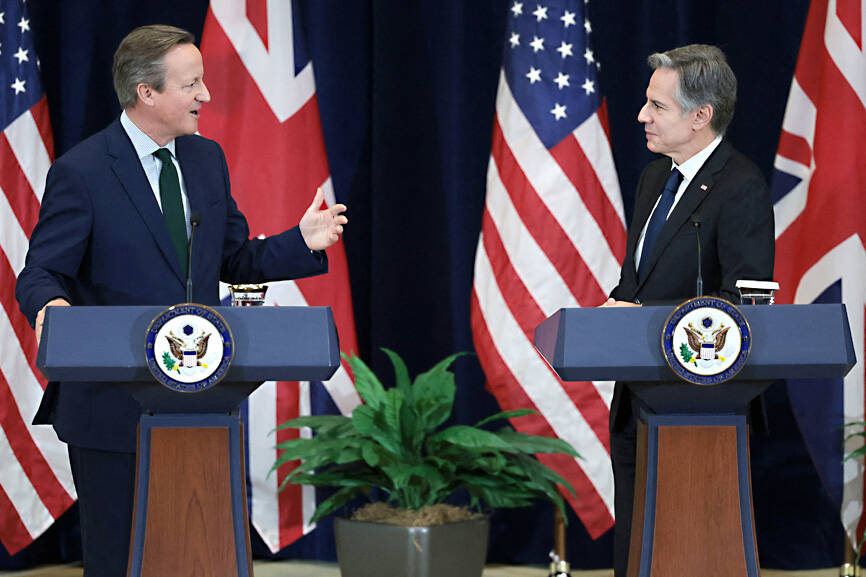US Secretary of State Antony Blinken and UK Secretary of State for Foreign, Commonwealth and Development Affairs David Cameron on Thursday reaffirmed their commitment to ensuring peace and stability across the Taiwan Strait.
The US and the UK are aligned on key challenges they face in the Indo-Pacific region, including “ensuring peace and stability across the Taiwan Strait,” Blinken told a news conference after he met with Cameron in Washington.
Blinken said that there is a joint US-UK military facility that “plays a vital role in the Indo-Pacific region” and beyond, enabling the two sides to help safeguard regional stability, respond rapidly to crises and “counter some of the most challenging threats that we face.”

Photo: AFP
The two countries are “engaging China where we can” to address global challenges such as safety issues related to artificial intelligence while “standing up to the PRC [People’s Republic of China] for its nonmarket practices,” he said.
Countering “Chinese cyberattacks and other hostile acts” are crucial for the UK and the US, Cameron said, while calling for closer cooperation between allies to deal with Beijing.
In related news, Cameron told the Aspen Security Forum in Washington that China must not pursue unification with Taiwan by force, violence or coercion.
Asked whether “China’s real goal is to take Taiwan without firing a shot” as it sought to do in Hong Kong, Cameron said that was “the China goal that has always been there.”
While China believes in unification with Taiwan, the “one China” policy shared by the UK and the US insists that “this cannot happen in a way that involves force or violence or coercion,” he said.
Since he left office as British prime minister in 2016, China has changed and become “so much more hostile,” Cameron said, citing examples such as its treatment of Uighurs, its tightened grip over Hong Kong and “wolf warrior” diplomacy.
“We need to harden our systems and be very clear-eyed” to deal with this “different China,” he said.
The UK not only has to protect itself and its systems against cybercrime and other threats posed by China, but also “align better with our allies,” he said.
“It’s much easier to stand up to this sort of things if we stick together,” he added.
Separately, European Council officials at the EU-China summit in Beijing on Thursday voiced concern over heightened tensions in the Taiwan Strait and the South China Sea, and expressed opposition to any unilateral attempt to change the “status quo.”
European Council President Charles Michel and European Commission President Ursula von der Leyen met with Chinese President Xi Jinping (習近平) for the first face-to-face meeting between the two sides in more than four years, followed by an exchange with Chinese Premier Li Qiang (李強).
“The EU reaffirmed its consistent one China policy and expressed concerns about increased tensions in the Taiwan Strait,” the European Council said in a press release after the meetings.
Regional and global prosperity and security are threatened by increased instability in the East and South China seas, the press release said.
The EU opposes any unilateral attempts to change the “status quo” by force or coercion, calling for disputes to be resolved “through peaceful means in accordance with international law,” in particular the UN Convention on the Law of the Sea, it said.

Hong Kong-based American singer-songwriter Khalil Fong (方大同) has passed away at the age of 41, Fong’s record label confirmed yesterday. “With unwavering optimism in the face of a relentless illness for five years, Khalil Fong gently and gracefully bid farewell to this world on the morning of February 21, 2025, stepping into the next realm of existence to carry forward his purpose and dreams,” Fu Music wrote on the company’s official Facebook page. “The music and graphic novels he gifted to the world remain an eternal testament to his luminous spirit, a timeless treasure for generations to come,” it said. Although Fong’s

China’s military buildup in the southern portion of the first island chain poses a serious threat to Taiwan’s liquefied natural gas (LNG) supply, a defense analyst warned. Writing in a bulletin on the National Defense and Security Research’s Web site on Thursday, Huang Tsung-ting (黃宗鼎) said that China might choke off Taiwan’s energy supply without it. Beginning last year, China entrenched its position in the southern region of the first island chain, often with Russia’s active support, he said. In May of the same year, a Chinese People’s Liberation Army Navy (PLAN) force consisting of a Type 054A destroyer, Type 055 destroyer,

Actor Darren Wang (王大陸) was questioned by prosecutors for allegedly orchestrating an attack on a taxi driver after he was allegedly driven on a longer than necessary route in a car he disliked. The questioning at the New Taipei City District Prosecutors’ Office was ongoing as of press time last night. Police have recommended charges of attempted murder. The legally embattled actor — known for his role in the coming-of-age film Our Times (我的少女時代) — is under a separate investigation for allegedly using fake medical documents to evade mandatory military service. According to local media reports, police said Wang earlier last year ordered a

President William Lai (賴清德) should protect Taiwan Semiconductor Manufacturing Co (TSMC), and stop supporting domestic strife and discord, former president Ma Ying-jeou (馬英九) wrote on Facebook yesterday. US President Donald Trump and TSMC on Monday jointly announced that the company would invest an additional US$100 billion over the next few years to expand its semiconductor manufacturing operations in the US. The TSMC plans have promoted concern in Taiwan that it would effectively lead to the chipmaking giant becoming Americanized. The Lai administration lacks tangible policies to address concerns that Taiwan might follow in Ukraine’s footsteps, Ma wrote. Instead, it seems to think it could